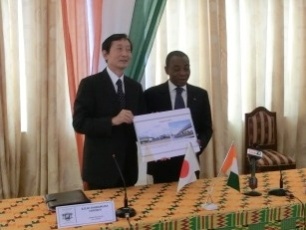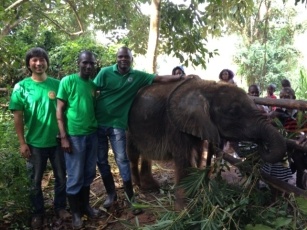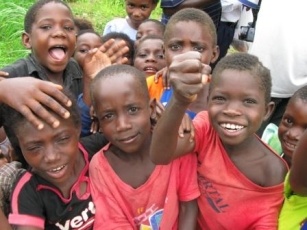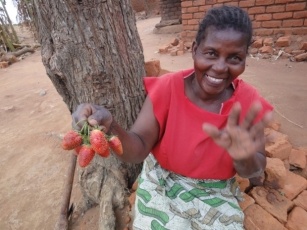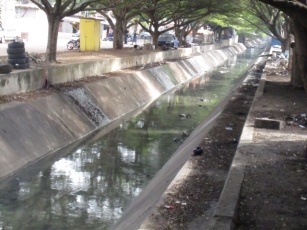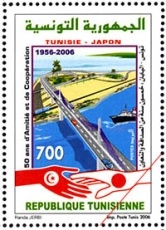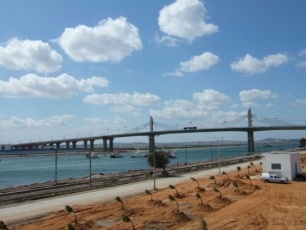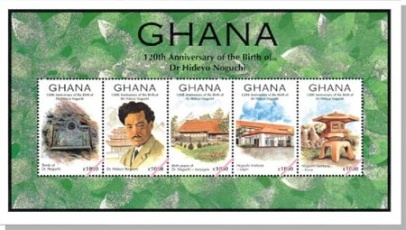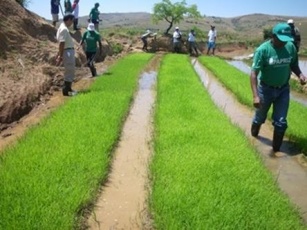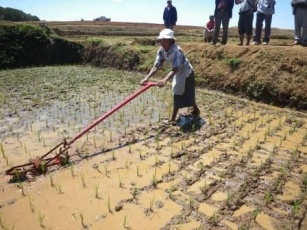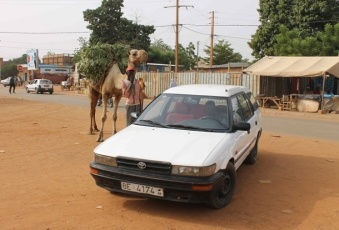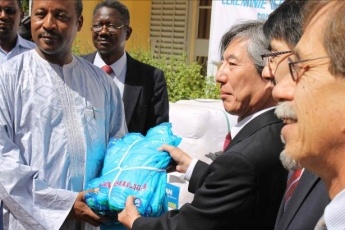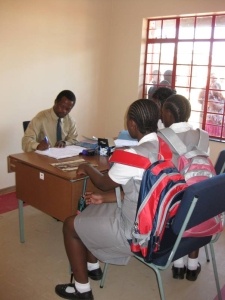Africa
Japan's ODA-related Stories from Africa
1. Japan’s Contribution and Challenges for Kenyan Healthcare Programs
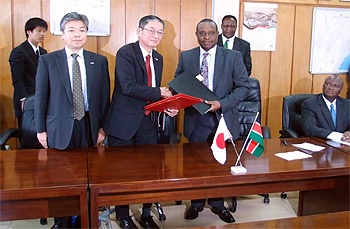
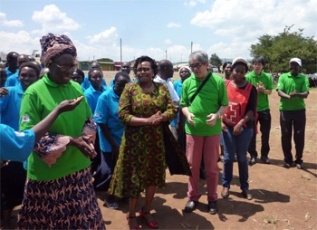
In August 2015, Japan signed Exchange of Notes with Kenya to provide up to 4 billion yen ($35 million) to fund important healthcare programs. With a goal of achieving universal health coverage, Kenya is focusing on making obstetrics care free, reinforcing the primary care system and expanding national healthcare insurance to those living in poverty.
2. Japanese Companies in Kenya
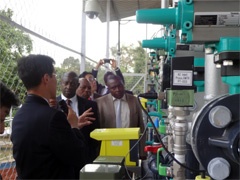
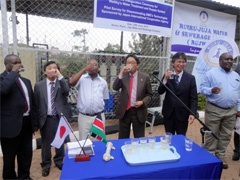
This year, the sixth Tokyo International Conference on African Development (TICAD) will be held in Kenya. A number of Japanese companies have already been in operation in Kenya; one of which is Wellthy Corporation. They provide water purification instruments and consultation services in cooperation with local water suppliers, contributing to hundreds of families to access clean water. Japan is actively assisting enthusiastic Japanese companies to open businesses in Kenya for further development of both countries.
3. “Kaizen” techniques used to support Ethiopia’s economic progress

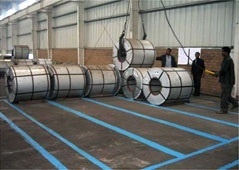
Kaizen, the well-known Japanese approach seeking continuous improvement, is the latest “soft skill” being exported to Ethiopia to help businesses there improve their competitiveness. The country is now enjoying rapid economic growth with the gross national product rising a robust 10% annually since 2005. To help this economic progress continue, “kaizen” can be applied to improve industrial and business techniques and to further develop the economy.
4. The Community Tourism Project in Ethiopia
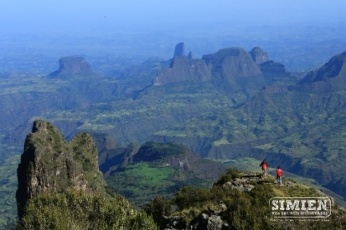
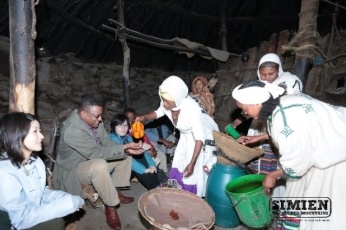
Ethiopia was chosen as the top destination in the world for tourists by the European Council on Tourism and Trade in 2015. To help build on this vote of confidence, Japan has launched a comprehensive project aimed at encouraging more tourism while helping to raise incomes for local residents those in the tourism industry. The project, based in the Simien Mountains National Park region, organizes tours to enjoy regional food and observe the manufacture of local products. The profits are paid directly to the hosts, ensuring that the project benefits the regional economy and the local ecology.
5. Towards the New “Ivorian Miracle”
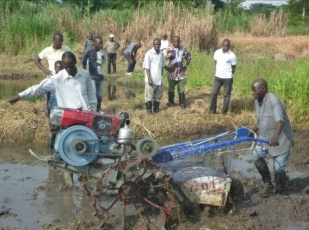
Japan and Cote d’Ivoire have launched a project to produce domestic rice in order to create a sustainable solution to the country’s food problems The program is the latest employing Japanese technology and specialists to help sustain the recent strong improvement in Cote d’Ivoire’s economy. Focusing on two main goals: restoring a safe, stable society and stimulating economic growth, Japan is committed to being a long-term partner to this important emerging country.
6. Infrastructure Improvement in Cote d’Ivoire
In 2015, Japan signed the first grant agreement with Cote d’Ivoire since the Ivorian crisis ended in 2011. Abidjan, the biggest city in Cote d’Ivoire, faces an urgent need to improve its infrastructures to manage a large population. This project to construct the Japan-Ivorian Friendship Intersection will help relieve some of the traffic congestion in the city center which has soared with approximately 130,000 cars entering the city every day.
The year 2016 will be a memorable year in which TICAD is being held for the first time in Africa, symbolizing African ownership. The relationship between Japan and Africa is entering into a new phase in August 2016 with TICAD VI.
7. The Relationship between Mozambique and Japan
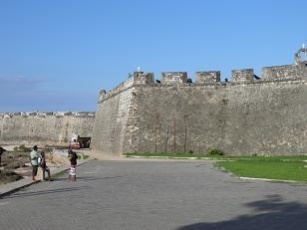
The Japan-Mozambique relationship dates all the way back to the 16th century when Yasuke, a samurai warrior from Mozambique, became a retainer to one of Japan’s most famous daimyos during that turbulent period. In this century, Japan in turn supports the sustainable development of Mozambique in numerous ways, including the restoration of the Saint Sebastian Fortress in the Island of Mozambique, the UNESCO world heritage site, which was also built in the 16th century.
8. Creating a Better Future: Japan-Djibouti Relationship
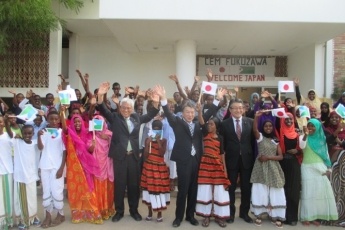
College de Fukuzawa located in Republic of Djibouti is the symbol of Japan-Djibouti friendship. Japanese support for Djibouti started in the 1980s in the form of food aid. Nowadays, the people-to-people relationship between the two countries is also growing. A number of students study at College de Fukuzawa, a school which is supported by Japan. The name “Fukuzawa” actually means “to create the future” in the Djiboutian local language. Japan and Djibouti will continue working together to create a better future for both countries.
9. Cooperation between Japan and Djibouti on Maritime Safety
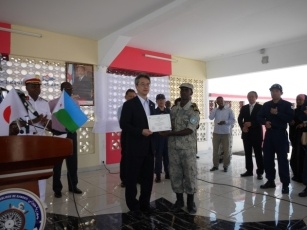
Maritime safety is crucial for the development of Djibouti. Since 2009, Japan has been actively assisting at multiple levels, such as providing training programs for the Djibouti Coast Guard (DCG). Further, in 2015, two patrol boats were transferred from the Japan Coast Guard to the DCG. These boats are expected to make a significant contribution to ensuring the safety of the Djiboutian people.
10. Water Supply and Health Improvement in Mozambique
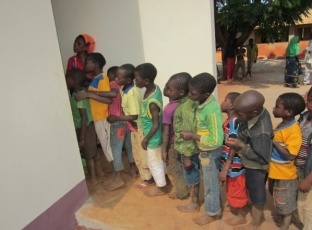
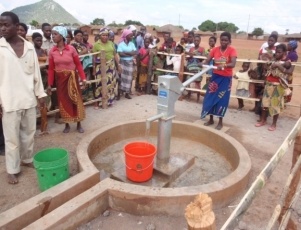
Without sufficient access to clean water and sanitation, nearly 580,000 infants around the world died of diarrheal diseases in 2013, making it the deadliest one for infants. To tackle this problem, Japan has initiated several projects, notably in Mozambique. One of these projects included the building of wells in local villages, as well as the creation and implementation of a water management system designed to supply water locally. Another project was aimed at teaching elementary school students how to use toilets hygienically and to encourage their family to install a private toilet to help maintain a healthier lifestyle.
11. The Return of the First Karate Master in Rwanda
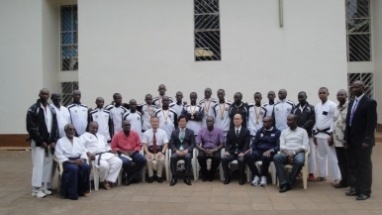

In 2014, the first Karate master in Rwanda returned to his students after 25 years. Hidetoshi Mizutani built a foundation for Karate, a Japanese martial art, in Rwanda during his volunteering period between 1987-1989. Soon after his departure from the country, the tragic genocide deprived many students of their lives. Yet, the spirit of Karate never ceased—surviving students built the Karate Federation and, in 2014, the first Japanese Ambassador’s Karate Cup was held. Mizutani was invited as the main judge. After the match, Mizutani was honored for his contribution to Karate in Rwanda by a former student, who is now the president of the Federation. There are plans for more Karate experts from Japan to be dispatched soon.
12. Japanese Businesses in Tanzania
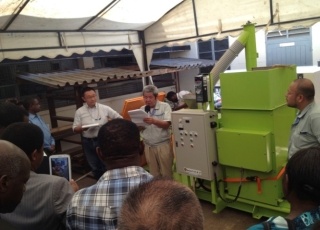
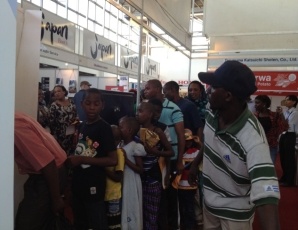
Since 2013, Japan has hosted and exhibited pavilions and stalls at the Saba Saba Fair, an international trade fair in Tanzania. Both public and private sector representatives cooperate with each other to promote Japanese business and its contribution to Tanzanian development. For instance, Tromso Co.Ltd provides the technical expertise and equipment to produce fuel from rice husks. This allows farmers to earn greater benefits from their produce. Japan is planning to open more businesses which fulfill local needs in Tanzania.
13. Relationship between Japan and Tanzania
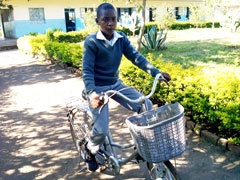
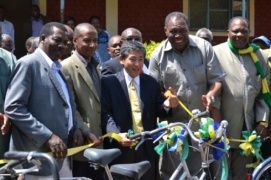
In Siha district in Tanzania, a boy cycles to school every day. He rides one of 500 bicycles donated from Ibaraki-City, Japan to improve mobility for the local population. The bicycles were donated as part of an agreement between Ibaraki City and Aggrey Mwanri MP of Tanzania, who participated in a seminar on regional administration held in Osaka. The new transportation method not only minimizes time and efforts spent by students in getting to school, but also helps community workers to more effectively improve the lives of local people. Japan and Tanzania are working together on a number of projects to strengthen local governments in Tanzania.
14. Economic Partnership between Japan and Madagascar
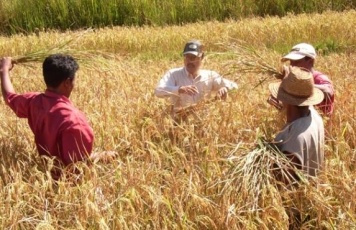
Since resuming their economic partnership in April 2014, Japan and Madagascar have been discussing how they should build the most effective partnership. Japan is planning to support the government to achieve the following four objectives: agricultural development, establishment of economic infrastructure, improvement of health and education, and good governance.
15. Japan-Ghana Partnership
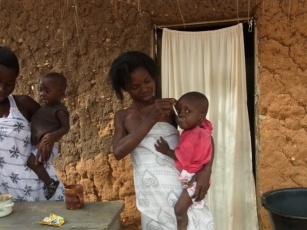
Ghana, one of the world’s most rapidly developing countries, is an important partner of Japan. The two countries work together on health and agricultural research and have also been making efforts to improve the economic gap between urban and rural areas in Ghana. The combined expertise of the two countries is expected to make significant contribution toward increasing Ghana’s prosperity.
16. A Social Business to Tackle Malnutrition in Ghana
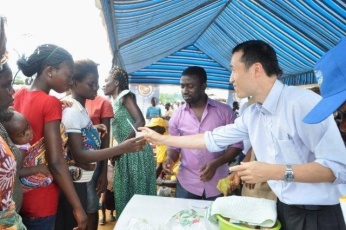
A Japanese food company has been working in cooperation with the University of Ghana and an US NPO to develop a nutritious new food product called ‘KOKO Plus’. In Ghana’s northern region, community-based saleswomen have organized promotional events, including a karaoke session. At the karaoke event, local mothers teamed up to compose and sing their original ‘KOKO Plus’ jingles. The products are now available at more than 600 shops in Ghana, and will help to improve the health of many local children.
17. The Road to Economic Development: Construction in DR Congo
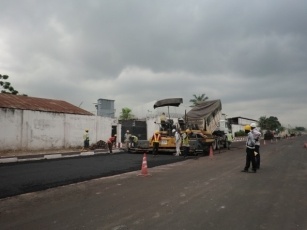
In 2014, a main road was built connecting Kinshasa airport to its city center, with support by Japanese constructors. As part of the Japanese construction philosophy, efforts were made to build mutual trust with local residents by paying full attention to the safety of road users, clearly marking construction sites and regularly cleaning the road with sprinkler trucks.
18. Matadi Bridge Maintenance Project: DR Congo
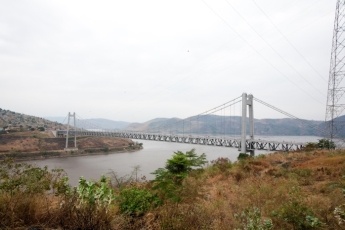
Matadi Bridge in the DR Congo has become a popular photo spot for couples on their honeymoon. Since its opening in 1983, the bridge has been maintained by local engineers with Japanese technical support. Engineers are now in the process of training new generations, passing down their expertise. To support these efforts, Japan has organized training programs for young engineers. They will play important roles in protecting and maintaining the bridge for future generations.
19. Japan-Uganda Friendship through Baseball
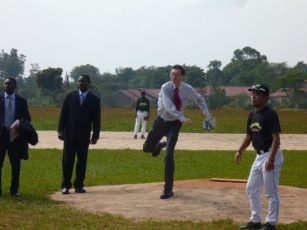
In 2014, Japan helped to build Uganda’s first baseball ground, which now serves as a training ground for the country’s national team. Baseball is becoming a highly popular sport in Uganda and now there are a number of Ugandan players in Japan’s professional baseball league. Japan will continue to support Uganda’s growing baseball culture and to foster friendship through sport between our two countries.
20. Walking with Elephants in Uganda
Charles, the baby elephant, was rescued by fishermen, when he almost drowned in a lake in Uganda. He is receiving good care from a Japanese professional zookeeper and his team at the Uganda Wildlife Education Centre, the only zoo in the country. The zookeeper was dispatched from Japan as a volunteer, as the zoo had never housed elephants before. Charles, the elephant, has grown up healthily and has befriended many visitors, contributing to their understanding of wildlife and conservation.
21. Malawi: Children in Africa’s Heartland
The Japan Overseas Cooperation Volunteer (JOCV) organization has dispatched over 1,700 youth volunteers to Malawi since 1971. One of its support projects focuses on science and math education. With a rapid population growth of approximately 3%, children are the key factors for the future development of Malawi. This project aims to provide the local children with necessary skills and knowledge in order to bring prosperity of the country.
22. Farmer Training Project in Malawi
The woman in this photo is one of the most successful farmers in Malawi. She currently receives a high number of orders for her delicious strawberries, but her production began with just one tiny plant. She has received training organized by Japanese volunteers, which provided skills and techniques, rather than actual products, in order to promote the self-sustainability of the trainees. Nowadays, almost 80% of these trainings are organized by local farmers like her, who have also learned from the same project.
23. Contribution to the Reduction of Malaria in Benin
Cotonou, Benin, had been suffering from malaria and other diseases due to the frequent flooding of waste water from a 52 kilometre-long drainage canal until 1997, when Japan built a drainage system of just 4.5 kilometres. Despite its relatively short length, the drainage system reduced flooding significantly, contributing to the improvement of the health of approximately 40,000 people. It has been almost 20 years, but this drainage system continues to play an important role in protecting local people.
24. “The Japanese Bridge” in Tunis
Le pont japonais—the Japanese Bridge—was built in 2009 in Tunis, Tunisia. Japanese engineers assisted with the construction of the bridge, which connects two major ports in the capital. In 2006, a special stamp was published to celebrate the 50th anniversary of Tunisia-Japan relations. The bridge appears on the stamp, symbolizing the friendship between the two countries.
25. Hideyo Noguchi, Japanese Bacteriologist in Ghana
The bacteriologist Hideyo Noguchi is one of Japan’s best-known scientists. His face appears on the 1,000 yen note. However, in Ghana, where he devoted himself to yellow-fever research, he was featured on special stamp. Noguchi’s name also appears on a medical institution in Ghana, where scientists from Japan and Ghana work together to address global health issues.
26. Japanese Agricultural Knowledge at work in Madagascar
Rice is a main staple diet in both Japan and Madagascar. Therefore, it’s important for the two countries to share ways to make rice cultivation more efficient and profitable. One of the techniques introduced to Madagascar is to combine wet and dry cultivation techniques, which makes a plant stronger. In addition, planting in straight lines at even intervals helps to avoid waste. These skills have doubled the harvest in some Madagascar farms while reducing the number of seedlings planted, increasing overall income for farmers.
27. Volunteers ready for Niger
Japanese volunteer groups hope to resume their activities in Niger, which were halted in 2011 due to political turbulence. Until 2011, some 684 volunteers from Japan worked in the country and built strong connections with local residents. Some even returned for more work after their contract had expired.
28. Prompt Support for Natural Disasters in Niger
Japanese assistance to Niger takes two forms : one is mid and long-term support, the other is emergency assistance in response to natural disasters. The latter is crucial for Niger, where heavy rain often causes serious flooding. Working to prevent such problems, the governments of Japan and Niger are in frequent communication to act promptly when necessary.
29. High School Project in Swaziland
Japan supported the Government of Swaziland with the opening of 12 new high schools between 2011 and 2013. A number of students in Swaziland had given up continuing their education as a result of the lack of school facilities in remote areas. The schools built through this project offer 3,880 students an opportunity to study in their neighborhoods. Further, parents do not have to be worried about the costs of students living alone, or walking home late at night. The schools also offer accommodation for teachers who have difficulty in commuting to the rural areas, in order to improve the quality of education.




